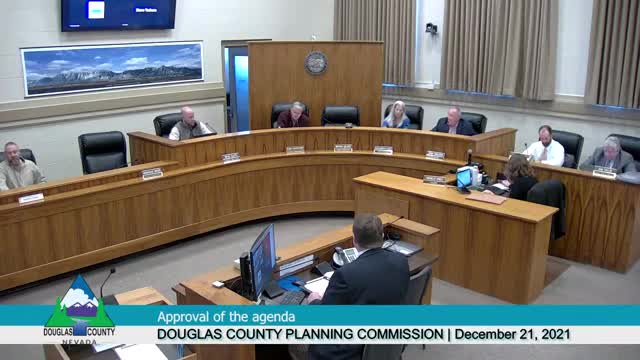Douglas County planning commissioners forward VHR ordinance amendments to commissioners after settlement-driven revisions
Get AI-powered insights, summaries, and transcripts
Subscribe
Summary
The Douglas County Planning Commission voted 5-0 to forward Ordinance 2021-1591 — which amends Title 20.622 governing vacation home rentals (VHRs) — to the Board of County Commissioners after staff and county attorneys described changes tied to a court settlement and enforcement concerns.
Douglas County planning commissioners voted 5-0 on Dec. 21, 2021, to forward Ordinance 2021-1591 to the Board of County Commissioners. The ordinance amends Title 20.622 of the Douglas County Code to revise occupancy and permit rules for vacation home rentals (VHRs), adjust enforcement and fines, and grandfather certain multiple-permit holders through Dec. 31, 2031.
The planning commission action came after attorneys and staff described modifications made following litigation and a court-ordered settlement conference. Doug Ritchie, an attorney with the Douglas County District Attorney’s Office, said the changes are intended to address constitutional issues raised in litigation and to incorporate terms from a proposed settlement that the Board of County Commissioners was scheduled to consider on Jan. 6, 2022.
The proposed ordinance makes several substantive changes. It raises the cap on tier 2 and tier 3 VHR permits from 600 to 650; clarifies occupancy limits by moving from a formula of “2 per bedroom plus 4” to a compromise of “2 per bedroom plus 2” (for example, a three-bedroom home would have a maximum occupancy of eight); requires VHR permit holders to carry liability insurance with $1,000,000 limits issued by an insurer licensed in Nevada; extends VHR advisory board member terms from two to four years; and modifies the fine schedule, restoring a $20,000 maximum fine for the most serious violations while providing a $5,000 interim fine category for permit holders who attempt to comply but lapse (such as a missed renewal).
Ritchie said the $20,000 cap is intended for “the worst offenders, primarily for providing false information” on applications or for operating without any permit, while the lower fine is aimed at those who are trying to comply but made a technical error. He also noted a federal judge, identified in the record as Judge Jones, had issued a temporary restraining order limiting imposition of the maximum fine during prior proceedings.
Sam Booth, deputy director of Community Development, told the commission the ordinance is a zoning text amendment to Title 20 and that staff’s report analyzes the four findings required for a text amendment. “Staff believes we can make this finding,” Booth said regarding consistency with the master plan and adequate public facilities policies, and he emphasized that the amendment is limited in nature and not site specific.
Commission discussion touched on grandfathering and ownership definitions. Commissioner Maureen (last name not specified) asked whether the 10-year grandfathering period applies to all provisions; Ritchie clarified that the 10-year term applies only to grandfathering multiple VHR permits and that, absent further policy changes, permit holders will be limited to one VHR after Dec. 31, 2031. Commissioner Mark (last name not specified) asked whether third-party insurance provided through listing services such as Airbnb would satisfy the insurance requirement; Ritchie said it would not. Sam Taylor of the District Attorney’s Office added that because owners may not use the same rental platform for every booking, the county requires an insured policy that names or covers the permit holder to ensure consistent protection.
Public comment was brief. Steve De Sherrer, speaking as a Douglas County citizen and a member of the original VHR advisory committee, said the ordinance’s cap remained “too low,” noting the advisory committee had recommended a cap of 725 after lengthy deliberations. Chairman (last name not specified) and multiple commissioners acknowledged the VHR advisory board’s ongoing role in monitoring the program and making recommendations for further refinements.
The Planning Commission voted on a motion to approve Ordinance 2021-1591 and forward it to the Board of County Commissioners “as amended,” with Commissioner Bryce (last name not specified) making the motion and Commissioner Mark (last name not specified) seconding. The vote was 5-0 in favor. The ordinance will next be considered by the Board of County Commissioners, where the settlement agreement referenced in the meeting record was scheduled for consideration at its Jan. 6, 2022 meeting.
The planning commission and staff said the VHR advisory board will continue to review the program and provide recommendations at intervals they deem appropriate — for example, in three months, six months or a year — and that further ordinance refinements may follow based on the advisory board’s findings and public feedback.
Ending: The forwarded ordinance formalizes the compromise reached in the settlement process and adjusts enforcement tools and permit limits; commissioners said they expect the advisory board and subsequent Board of County Commissioners review to shape further refinements.
